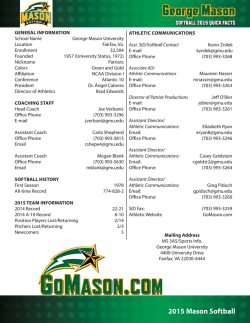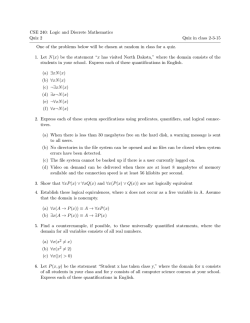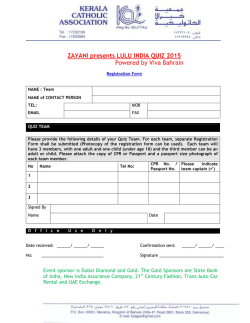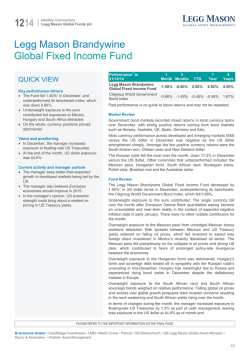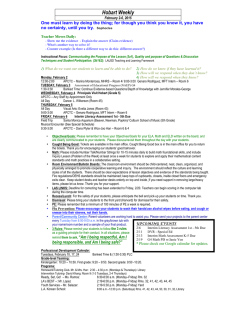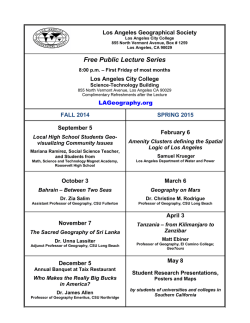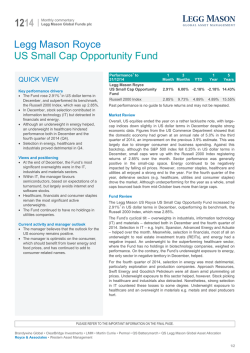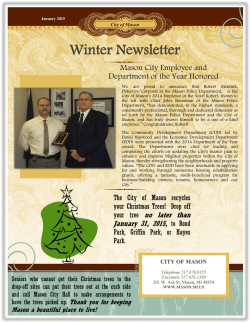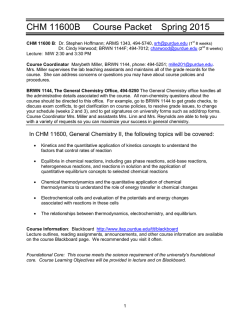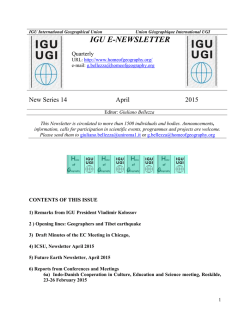
GGS 101 DL2 - George Mason University
GGS 101 DL2: Major World Regions Spring Semester 2015 GGS 101 DL2 fulfills Mason Core requirement in Global Understanding Instructor: Patricia Boudinot Email: [email protected] Teaching Assistant: Peter Lamois Email: [email protected] Virtual Office Hours: I am available between Sunday at 7 pm through Friday at 7 pm to respond to student inquiries and during this five day period, I will try my very best to respond within 24 hours. An appointment can be scheduled via Skype. Campus Office Hours: Wednesday between noon and 2 pm at Exploratory Hall, Room 2201. I highly encourage the students to either meet me via Skype or come to my office. Honor Code: “Students members of the George Mason University community pledge not to cheat, plagiarize, steal and/or lie in matters related to academic work.” I In this course, you are not to: Access sources/information during an on-line exam/quiz Give help or information/work to a friend/classmate Read the Honor Code for a list of definitions and examples Content: Emphasis will be made on areal differentiation and the role geographic differences play in the interpretation of the current world scene (from the George Mason University Catalog 2010-2011).” In the changing world, this course will encourage students to make important connections across boundaries. 1 Course Prerequisites: There are no formal prerequisites. Learning Outcomes: At the end of the course, the student will be able to: 1. Understand spatial awareness by using appropriate geographic tools 2. Describe and then explain a geographic document such as map/photograph/chart. 3. Identify, evaluate, and properly cite resources appropriate to the field. 4. Understand the global patterns. 5. Understand the interconnectedness, difference, and diversity of a global society. 6. Analyse global problems and/or issues. 7. Build an international trip project using Google Earth. Required Textbook: Major World Regions by H.J. De Blij, Peter O. Muller and Jan Nijman, Wiley Edition Please note that this textbook can only be found at the GMU bookstore as it is a custom textbook. The information in this custom textbook is originally from Geography; realms, Regions and Concepts, 16th edition by H.J. De Blij, Peter O. Muller and Jan Nijman, Wiley Edition Learning Community: In this online course, each week opens on Tuesday. Each week is structured as follows: readings in the textbook, video lectures and assignments. Working online requires dedication and organization. Students must check their GMU email messages on a daily basis and communicate any questions or problems that might arise promptly. Netiquette In our online learning community, we must be respectful of one another. Please be aware that innocent remarks can be easily misconstrued. Sarcasm and humor can be easily taken out of context. When communicating, please be positive and diplomatic. I encourage you to learn more about Netiquette. 2 Important dates: Last day to add classes: Tuesday January 27, 2015 Last day to drop with no tuition penalty: Tuesday January 27, 2015 Performance-based Assessments You will be evaluated by the tasks which appear below. I expect all students to submit all the assignments on time as this is a no late submission policy distance education course: any missing assignment will be graded as zero. Course orientation quiz The course orientation quiz which will be offered as soon as Week 0 and it is due no later than Thursday January 29, 2015 at 11:59 pm. Please review the syllabus. The course orientation quiz will last 15 minutes, will display eight questions: each question, worth .25 point, will be multiple choice or True/False. Test Three tests are scheduled this Semester. Each test will last 50 minutes, will display thirty four questions ( including two extra credit questions): each question, worth .5 points, will be multiple choice or True/False. Each of the three tests will open on Friday at 6 am and will close the following Monday no later than 11:59 pm. Please understand that all materials will be used to generate questions: textbook readings and other items appearing in the reading assignments, close-captioned video lectures and exercises. Exercise Five exercises are scheduled this Semester. Each exercise will open either on Tuesday (Week/Session 1) at 6 am or on Thursday (Week/Session2) at 6 am and will close the following Monday at 11:59 pm. 3 Discussion Two Discussions are scheduled this Semester. Discussions will open on Blackboard on Thursday at 6 a.m. and it will close the following Monday at 11:59 pm. There are two mandatory steps to completing the Discussion Step 1: submit your initial post no later than Saturday at 11:59 pm . Step 2: read your classmates’ posts and reply to four of them between Sunday morning and Monday no later than 11:59 pm. Please note that your initial post and your four replies will be accurate and will range between 50 to 60 words Final Project You will build a one week trip either in South America or in East Asia. The description of the Final Project can be found in the “Syllabus and Documents”. Please read it carefully. There are three mandatory steps to completing your Final Project. 1. Step 1/ Week 4/Session 1: submit Final Project Destination and your Final Project bibliography (sources from where you will get your information to complete your project). 2. Step 2/ Week 5/Session 1: submit Final Project outline or draft. 3. Step 3: submit your Final Project no later than Monday March 16, 2015 at 11:59 pm Please note that all the times are EST (Eastern Standard Time) STUDENTS ARE EXPECTED TO PARTICIPATE IN ALL ACTIVITIES. Grading Percentage 50% Course Orientation Quiz and Tests 20% Final Project 10% Discussions 20% Exercises 4 Grade cutoffs A 90% – 100% B 80% - 89.99% C 69% - 79.99% D 60% - 68.99% F less than 60% Schedule: Please note that the page numbers in the "reading assignments" refer to the page number appearing at the bottom of the page in your textbook. Date Week 0 01/13 Readings 3 easy steps Videos Orientation video Week 1 / Session 1 01/20 Geography World on maps and Geography’s perspective: Page 9 to page 12 World Geographic Realms: Page 12 to page 16 What do Geographers do ? Page 42 Realms of Population Page 23 to Page 25 Demographic transition Page 198 to 201 Geography Week 1 / Session 2 01/22 World Population Issues Geographies of Week 2 / Session 1 Development 01/27 World Development Page 34 to Page 39 Issues Geographic Tools Assignments Course orientation quiz due no later than 01/29 at 11:59pm Please download and get familiar to Google Earth Regional Geography Introduce yourself GIS Demo World Population 1 World Population 2 Development 1 Development 2 Exercise 1 Due no later than 01/26 at 11:59 pm Course orientation quiz will close on 01/29 at 11:59 pm Exercise 2 Due no later than 02/02 at 11:59 pm 5 Week 2 / Session 2 01/29 North America Page 99 to Page 114 Week 3 / Session 1 02/03 Middle America Week 3 / Session 2 02/05 South America Page 121 to Page 133 Middle America 1 Week 4 / Session 1 02/10 Sub Saharan Africa Africa’s historical Sub Saharan Africa 1 geography Page 159 to Page 165 Sub Saharan Africa 2 Postcolonial Africa Page 165 to Page 166 Africans and their land Page 169 to Page 173 Week 4 / Session 2 02/12 East Asia China’s historical role in East Asia Page 217 to Page 221 Japan’s historical role in East Asia Page 221 to Page 223 East Asia’s economic stature Page 225 to Page 226 Geopolitics in East Asia Page 226 to Page 228 Russian roots Page 80 to Page 81 Building the Russian Empire Page 82 to Page 87 The new Russia Page 87 to Page 92 Birthplace of civilizations Page 186 to Page 188 Foreign invaders Page 188 to Page 189 Week 5 / Session 1 02/17 Russia Week 5 : Session 2 02/19 South Asia North America 1 North America 2 Middle America 2 Page 139 to Page 153 South America 1 South America 2 East Asia 1 East Asia 2 Russia 1 Russia 2 South Asia 1 South Asia 2 Test 1 Due no later than 02/02 at 11:59 pm Exercise 3 Due no later than 02/09 at 11:59 pm Discussion 1 Post due no later than 02/07 at 11:59 pm 4 replies due no later than 02/09 at 11:59 pm Final Project Step 1 due no later than 02/16 at 11:59 pm Test 2 Due no later than 02/16 at 11:59 pm Final Project Step 2 Due no later than 02/23 at 11:59 pm Discussion 2 Post due no later than 02/21 at 11:59 pm 4 replies due no later than 02/23 at 11:59 6 Week 6 / Session 1 02/24 Europe Week 6 / Session 2 02/26 Europe Week 7 / Session 1 03/03 South East Asia The geopolitics of modern South Asia Page 190 to Page 193 Geographical features Page 46 to Page 50 Contemporary Europe Page 54 to Page 57 European unification Page 58 to Page 60 Consequences of unification Page 61 to Page 62 Defining Europe: difficult choice Page 62 to Page 69 Population Geography Page 237 to Page 241 South East Asia’s emerging markets Page 245 to Page 247 States and boundaries Page 249 to Page 253 pm Europe 1 Europe 2 European Union 1 European Union 2 South East Asia 1 South East Asia 2 Exercise 4 is due no later than 03/02 at 11:59 pm Test 3 Due no later than 03/02 at 11:59 pm Exercise 5 Due no later than 03/09 at 11:59 pm Final Project is due no later than Monday March 16 at 11:59 pm Technology Requirements Hardware: You will need access to a Windows or Macintosh computer with at least 2 GB of RAM and to a fast and reliable broadband internet connection (e.g., cable, DSL). A larger screen is recommended for better visibility of course material. You will need speakers or headphones to hear recorded content and a headset with a microphone is recommended for the best experience. For the amount of Hard Disk Space required to take a distance education course consider and allow for: 1. the storage amount needed to install any additional software and 2. space to store work that you will do for the course. 7 If you are considering the purchase of a new computer, please go to http://itservices.gmu.edu/services/services-students.cfm to see recommendations. Software: This course uses Blackboard as the learning management system. You will need a browser and operating system that are listed compatible or certified with the Blackboard version available on the myMason Portal. See supported browsers and operating systems. Log in to myMason to access this course. Access to a Computer Workstation with: Web browser (See Blackboard supported browsers and operating systems) Adobe Acrobat Reader (free download) Flash Player (free download) Windows Media Player (free download) Microsoft Office Word (purchase) Note: If you are using an employer-provided computer or corporate office for class attendance, please verify with your systems administrators that you will be able to install the necessary applications and that system or corporate firewalls do not block access to any sites or media types. Student Expectations Academic Integrity Students must be responsible for their own work, and students and faculty must take on the responsibility of dealing explicitly with violations. The tenet must be a foundation of our university culture. [See http://academicintegrity.gmu.edu/distance]. Honor Code Students must adhere to the guidelines of the George Mason University Honor Code [See http://academicintegrity.gmu.edu/honorcode]. MasonLive/Email (GMU Email) Students are responsible for the content of university communications sent to their George Mason University email account and are required to activate their account and check it regularly. All communication from the university, college, school, and program will be sent to students solely through their Mason email account. [See https://thanatos.gmu.edu/masonlive/login]. Patriot Pass Once you sign up for your Patriot Pass, your passwords will be synchronized, and you will use 8 your Patriot Pass username and password to log in to the following systems: Blackboard, University Libraries, MasonLive, myMason, Patriot Web, Virtual Computing Lab, and WEMS. [See https://thanatos.gmu.edu/passwordchange/index.jsp]. Responsible Use of Computing Students must follow the university policy for Responsible Use of Computing. [See http://universitypolicy.gmu.edu/1301gen.html]. Students with Disabilities Students with disabilities who seek accommodations in a course must be registered with the George Mason University Office of Disability Services (ODS) and inform their instructor, in writing, at the beginning of the semester [See http://ods.gmu.edu]. Students are expected to follow courteous Internet etiquette Student Services University Libraries University Libraries provides resources for distance students. [See http://library.gmu.edu/distance]. Writing Center The George Mason University Writing Center staff provides a variety of resources and services (e.g., tutoring, workshops, writing guides, handbooks) intended to support students as they work to construct and share knowledge through writing. [See http://writingcenter.gmu.edu]. You can now sign up for an Online Writing Lab (OWL) session just like you sign up for a face-to-face session in the Writing Center, which means YOU set the date and time of the appointment! Learn more about the Online Writing Lab (OWL) (found under Online Tutoring). Counseling and Psychological Services The George Mason University Counseling and Psychological Services (CAPS) staff consists of professional counseling and clinical psychologists, social workers, and counselors who offer a wide range of services (e.g., individual and group counseling, workshops and outreach programs) to enhance students' personal experience and academic performance [See http://caps.gmu.edu]. Family Educational Rights and Privacy Act (FERPA) The Family Educational Rights and Privacy Act of 1974 (FERPA), also known as the "Buckley Amendment," is a federal law that gives protection to student educational records and provides students with certain rights. [See http://registrar.gmu.edu/privacy]. 9 10
© Copyright 2026
